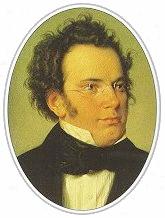![Piano's Solo Corner [Image]](piano8b.gif)
![Piano's Solo Corner [Image]](piano8b.gif)

| Date/Place of Birth: | 31 January, 1797 in Vienna. |
| Personality: | A very shy, short-sighted composer.
However, to his close friends, he was charming, humorous and loyal. Sometimes,
he was moody and violent, especially during his illness. Even Schubert's
friend, Leopold von Sonnleithner said,"He(Schubert) never laughed fully
and joyfully, but only managed a toneless chuckle,"
Besides that, being impulsive and generous, money meant nothing to Schubert. He was always run out of money and relied very much on his friends for financial support. Indeed, to Schubert, his friends was most important than anything in the world. |
| Piano-Playing Style: | Schubert's own playing was evidently explained by his friend, Albert Stadler, saying, "To see and hear him(Schubert) play his own pianoforte compositions was a real pleasure. A beautiful touch, a quiet hand, clear, neat playing with full of insight and feeling," Sometimes he played cheerfully with fingers almost dancing on the piano keys especially in his famous waltzes and ländlers. Therefore, it is no doubt that Schubert was a very able pianist and skilled accompanist as well. However, he never achieved the status of keyboard virtuoso like Beethoven. |
| Music: | Schubert's music is highly original.
He, once his style was formed, broke away more than any composer of the
time. In addition, Schubert's music is one of the greatest and most beautiful
music ever composed. On the whole, his piano music was not intended for
a virtuoso playing in a concert hall but for performing to friends or listeners
in intimate surroundings. Besides that, Schubert often incorporated in
his piano music singable melodies with emphasis that the melody must be
played like a beautiful human voice. Other than the spirit of song was
found in his music, the spirit of dance also invoked from his ländlers,
minuets, écossaises etc. This indicated that Schubert's music was
also played for his friends to dance.
Apart from his single-minded melodic gift, Schubert's harmonic ideas were superb -- bold modulation from key to key; introduction of a totally new, beautiful material suddenly after the opening; a surprise shift from a quiet passage to dramatic impact in a Beethovenian style. Moreover, Schubert's works were sometimes unorganized and difficult to understand as dynamic level and notes were sometimes illegible. Perhaps this was because of his very fast composing habit. However, we must understand that Schubert was always back in a gloomy mood and sufferred severe illness. Therefore, Schubert's music, even the happiest, has a tinge of sadness. It was touching, beautiful melodies that rank Schubert among the greatest composers in the world. |
| Composing Habit: | Schubert usually concentrated
on composing in the morning while he usually went to cafés for the
rest of day. There is no doubt that Schubert, like Mozart, was one of the
fastest composers in musical history. He could think a whole work in his
head and immediately write it down. There was no sketch produced even for
the big works like symphonies. There was one time when Schubert was asked
by his friend to set a poem Ständchen". Just after reading that poem
a few times carefully, Schubert set it to music in an incredible speed
without difficulty. In addition, Schubert was very capable of producing
so much of beautiful, unique melodies in his beloved songs.
Lastly, a frequent practice of Schubert's -- he left many
unfinished compositions eg. Symphony no 8 "Unfinished", a few piano sonatas
and string quartets. No one knows why he failed to complete his works.
There were various reasons:
|
| Schubert's Quote: | "Even evening when I retire to
bed, I hope I may not wake again; and each morning brings back yesterday's
grief"
Schubert, 1824 "This is my end."
"There is no man in the world as wretched and unhappy
as I am!"
"I still hope to be able to make something of myself,
but who can do anything after Beethoven?"
|
| Schubert's Death: | Before Schubert died, his friends and admirers were helping to organise the first major public concert for him. It was unfortunately that Schubert's health worsening. At the age of 31 only, he finally died on 19 November, 1828 at his brother Fredinand's house. His funeral was attended by some of his close friends. |